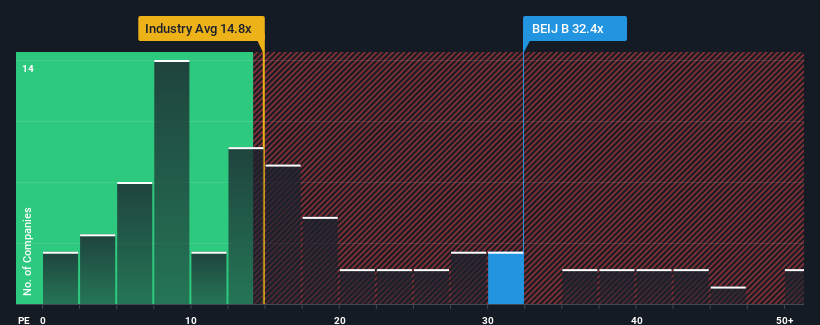- Sweden
- /
- Trade Distributors
- /
- OM:BEIJ B
Beijer Ref AB (publ)'s (STO:BEIJ B) Popularity With Investors Is Under Threat From Overpricing

When close to half the companies in Sweden have price-to-earnings ratios (or "P/E's") below 21x, you may consider Beijer Ref AB (publ) (STO:BEIJ B) as a stock to potentially avoid with its 32.4x P/E ratio. Nonetheless, we'd need to dig a little deeper to determine if there is a rational basis for the elevated P/E.
Beijer Ref certainly has been doing a good job lately as it's been growing earnings more than most other companies. The P/E is probably high because investors think this strong earnings performance will continue. If not, then existing shareholders might be a little nervous about the viability of the share price.
See our latest analysis for Beijer Ref

Is There Enough Growth For Beijer Ref?
There's an inherent assumption that a company should outperform the market for P/E ratios like Beijer Ref's to be considered reasonable.
If we review the last year of earnings growth, the company posted a terrific increase of 49%. The latest three year period has also seen an excellent 146% overall rise in EPS, aided by its short-term performance. Accordingly, shareholders would have probably welcomed those medium-term rates of earnings growth.
Turning to the outlook, the next three years should generate growth of 5.6% per year as estimated by the five analysts watching the company. Meanwhile, the rest of the market is forecast to expand by 20% each year, which is noticeably more attractive.
In light of this, it's alarming that Beijer Ref's P/E sits above the majority of other companies. It seems most investors are hoping for a turnaround in the company's business prospects, but the analyst cohort is not so confident this will happen. There's a good chance these shareholders are setting themselves up for future disappointment if the P/E falls to levels more in line with the growth outlook.
The Bottom Line On Beijer Ref's P/E
While the price-to-earnings ratio shouldn't be the defining factor in whether you buy a stock or not, it's quite a capable barometer of earnings expectations.
We've established that Beijer Ref currently trades on a much higher than expected P/E since its forecast growth is lower than the wider market. Right now we are increasingly uncomfortable with the high P/E as the predicted future earnings aren't likely to support such positive sentiment for long. This places shareholders' investments at significant risk and potential investors in danger of paying an excessive premium.
Many other vital risk factors can be found on the company's balance sheet. Take a look at our free balance sheet analysis for Beijer Ref with six simple checks on some of these key factors.
It's important to make sure you look for a great company, not just the first idea you come across. So take a peek at this free list of interesting companies with strong recent earnings growth (and a low P/E).
Valuation is complex, but we're here to simplify it.
Discover if Beijer Ref might be undervalued or overvalued with our detailed analysis, featuring fair value estimates, potential risks, dividends, insider trades, and its financial condition.
Access Free AnalysisHave feedback on this article? Concerned about the content? Get in touch with us directly. Alternatively, email editorial-team (at) simplywallst.com.
This article by Simply Wall St is general in nature. We provide commentary based on historical data and analyst forecasts only using an unbiased methodology and our articles are not intended to be financial advice. It does not constitute a recommendation to buy or sell any stock, and does not take account of your objectives, or your financial situation. We aim to bring you long-term focused analysis driven by fundamental data. Note that our analysis may not factor in the latest price-sensitive company announcements or qualitative material. Simply Wall St has no position in any stocks mentioned.
About OM:BEIJ B
Beijer Ref
Provides refrigeration, heating, and air conditioning solutions worldwide.
Flawless balance sheet with moderate growth potential.


